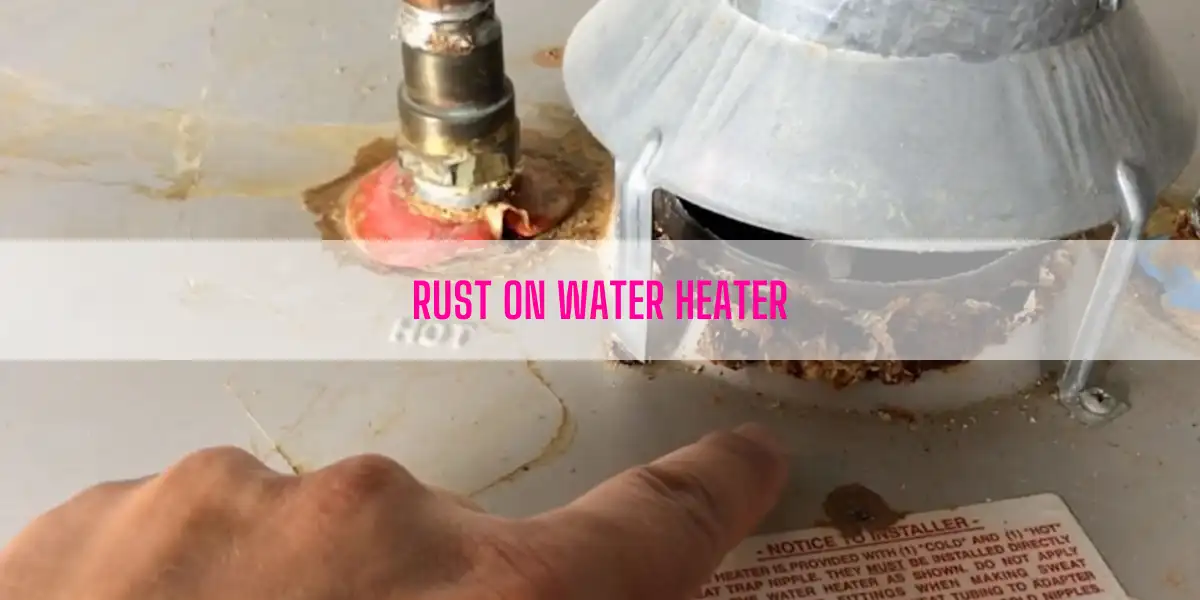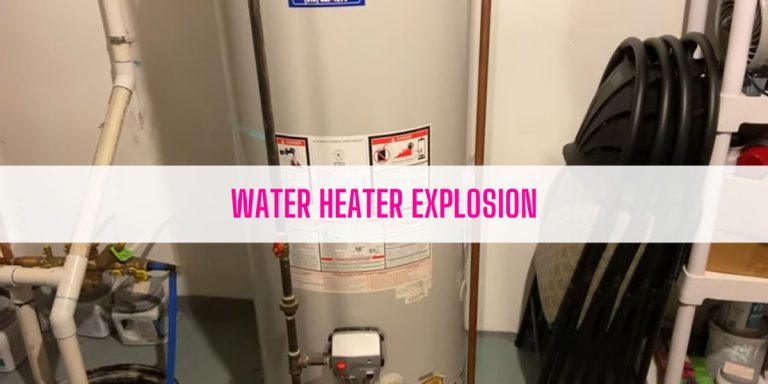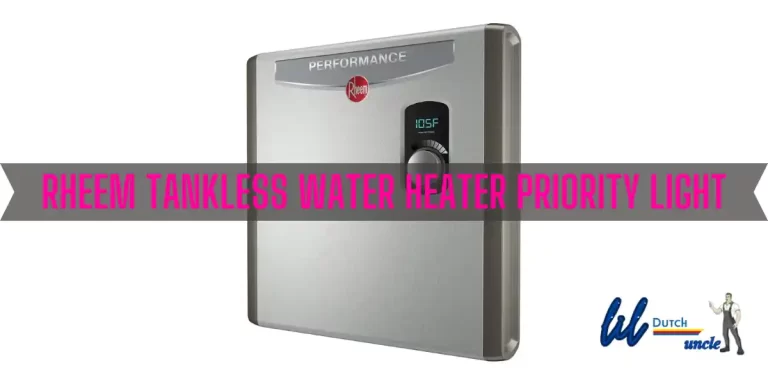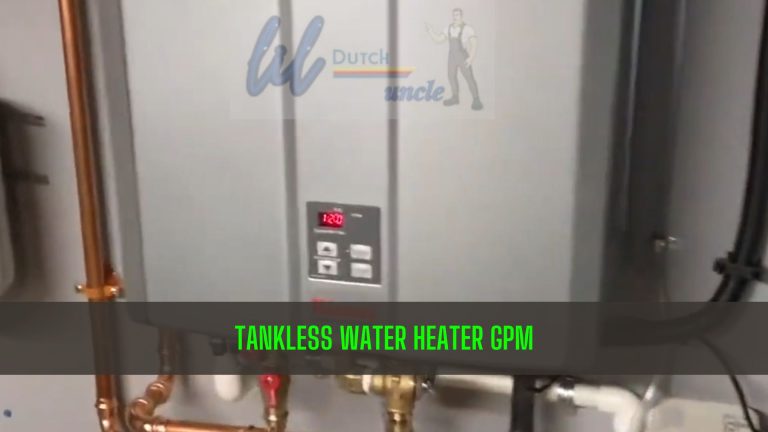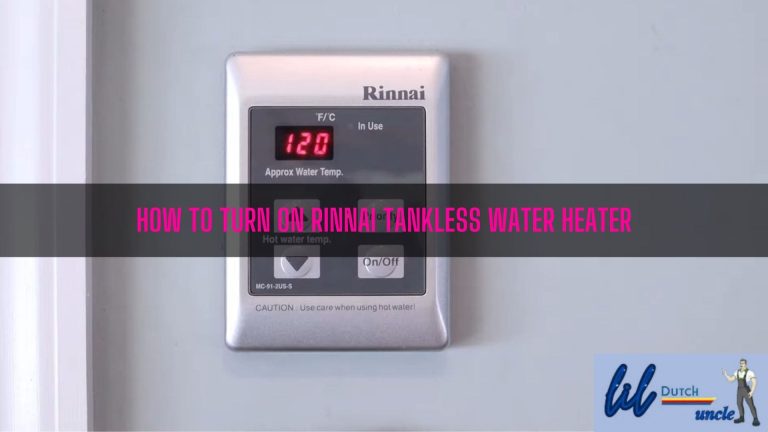Rust On Water Heater [What Does It Mean]
Rust on water heater is normal because it goes through a lot of wear & tear- 24 hours a day and 365 days a year. It’s because every family member relies on a water heater for everyday use like bathing & washing.
Due to the wear & tear, poor maintenance, and corrosive water, we end up with a rusty water heater.
Fortunately, this guide will help you in dealing with the corroded water heater. I will also describe ways you can follow to prevent the unit from rusting. So, stay in tune with this article till the end.
Table of Contents
What Does Rust On Water Heater Mean?
Several reasons like defective anode rod, poor maintenance, blocked flue, and mineral contents in the supply water cause the water heater to rust. If there forms corrosion on the unit, understand there is something wrong.
Rust can build up on different components of the unit like on the tank, top of the unit, or at the bottom of the water heater.
Below, I will introduce some parts of the unit that are prone to form rust, why the corrosion builds up, and how you can fix the rusting issue.
Rust On Water Heater Tank
A corroded anode rod is the main culprit that causes rust on the tank of your water heater.
Anode rod on a water heater is specially designed to prevent the tank from rusting. Manufacturers install it through the center of the unit.
Over time, this metal piece gets corroded by the mineral contained in the supply water. What happens then is- the entire metal part of the unit is exposed to the rust and corrosion. In return, the water tank starts corroding.
Turns out, excessive mineral contents in the water or poor maintenance of the unit can also make the corroding process faster.
What To Do:
First off, check the condition of the anode rod. If it seems rusty or too fragile, you must replace it. I highly recommend you call a professional to inspect the anode rod and make the replacement.
However, you can check the following tutorial to replace the anode rod by yourself if you are handy:
Next, check the water condition of your area. If it’s too hard, you should install a water softener to prevent the anode rod from rusting fast.
Finally, the best suggestion I can offer is to maintain and flush the unit according to the manufacturer guideline. Flush the water heater once a year. If the level of hard water is noticeable, you should flush the tank every six months.
Note: Replacing the water heater may not bring any luck if your water heater is old like you use it for over five years. If the water tank starts rusting through, you should replace the entire water heater.
Rust On Top Of Water Heater
A rust formation on top of your water heater is a result of:
- Condensation in the flue
- A leaky connection between the unit and the water supply pipe
- Nipples of your unit are not dielectric.
The first culprit I suspect most is condensation inside the flue if you have a rust formation like this:
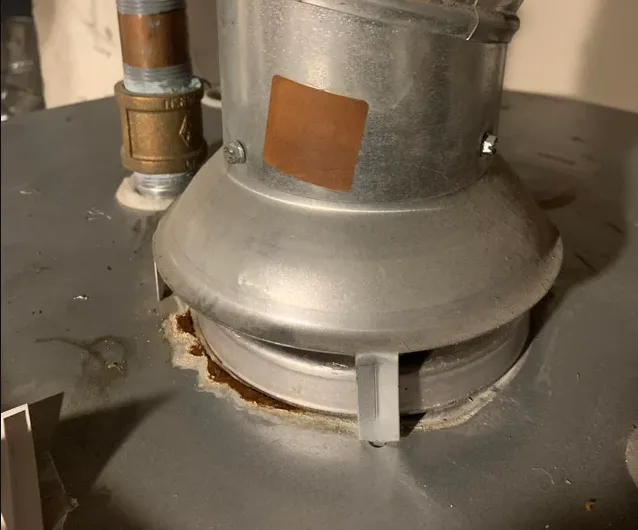
When the flue gets obstructed or there is too much restriction, the single wall flue lets the combustion gas cool down too much.
As a result, the condensation drips down the top of the unit. And you already know that the condensation is a bit acidic, which reacts with the metal and corrodes the top of the tank in the process.
Forgetting to install a chimney liner when you last time replacing the unit can also throw a wrench into work. It causes the flue gasses to condense in the flue.
Secondly, corrosion can also form on top of the water heater if the connection between the water heater and the water supply is leaky. Due to the leaky connection, a puddle of water will form on top of the unit and cause the tank to rust.
And thirdly, you will observe a corrosion buildup on the top of the water heater like this if your unit nipples are not dielectric.
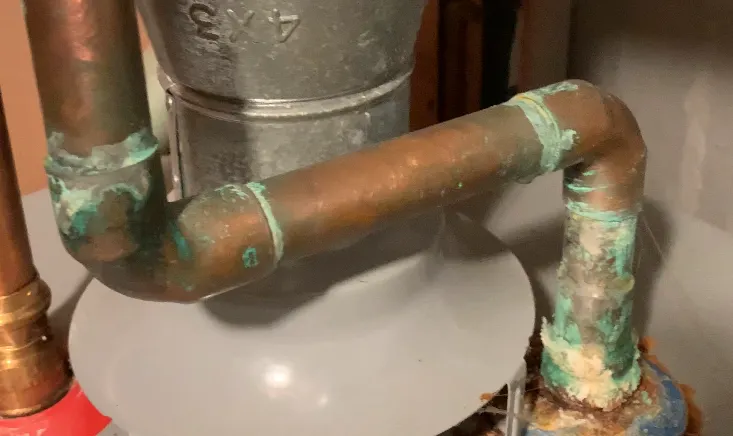
You must use a special type of fittings called dielectric union to isolate the two dissimilar metals electrically- when joining copper plumbing into galvanized plumbing.
If you or your plumber doesn’t use the dielectric unit, those dissimilar base metals will react galvanically. And it will cause rapid corrosion especially on the steel tank and the tank nipples.
Apart from these, poor soldering can corrode the piping and top of the water tank.
What To Do:
First off, check the flue for restrictions. You can easily test the flue of your water heater by lighting a match and leading its smoke to go through it. If the smoke doesn’t go through the flue or returns, understand the flue gets clogged.
In this case, you must clean the water heater flue. To clean the flue piping, you can release the blockage by running a flue cleaning tool through it. Alternatively, take apart the flue piping and use a cloth or brush to brush away the dirt and debris.
Next, inspect the connection between the water heater and the water supply pipe for a leak. If you find a leak, call a technician to see if he can repair the leak or not.
Finally, the installer or plumber uses dielectric union to separate the plumbing of two dissimilar metals like joining copper plumbing into galvanized plumbing.
Another suggestion I can offer you is to look at the water heater supply hoses next time you go to get a water heater. Ensure there is a non-conductive plastic ring that separates the threaded brass female swivel nut that is in direct contact with steel from the supply hose.
Also, ensure your plumber solders those piping correctly. Make sure your plumber doesn’t use a strong acid-based flux to solder the piping. If he uses such a type of flux, he must wipe away the residue after soldering.
Rust On Water Heater Element
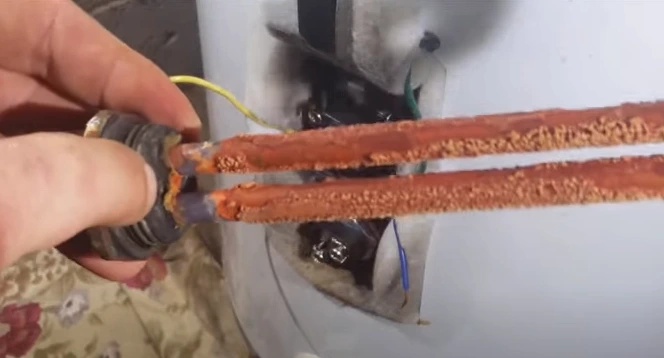
Does your water heater stop producing hot water? If yes, I blame the heater element most if it’s an electric water heater.
The heating element can’t transfer heat if there forms corrosion on the heating element. Several reasons are responsible for forming rust on the heating element. For example, excessive amounts of mineral contents in the city water will corrode the heating element.
Besides, if you run the water heater at the highest temperature setting, it will make the heating element more rusty. It’s because when there is scale on the element, it slows down heat transfer while speeding up the rust formation.
What To Do:
Inspect the heating element in the first place. In this case, turn the electric supply off to the water heater.
Then, remove the upper access panel using a flat head screwdriver and fold away the insulation.
Next, disconnect two power wires from the heating element. Ensure you mark the terminal so that you can reattach the wires in the right terminal.
Afterward, use a socket element wrench to remove the heating element. Then, soak the heating element in the solution of WD-40. If the element looks so fragile, you must replace it with a new one.
Follow the same steps to inspect and replace the lower heating element as well.
However, I highly recommend you to maintain the heating element according to the manual. Flush the unit annually or every six months to remove sediment buildups. If needed, install a water heater softener if there is too much mineral content in your supply water.
All these will help in preventing the heating element from rusting quickly.
Rust On The Bottom Of the Water Heater
If your water heater is rusting from the bottom of the unit, it’s because either the tank is leaky or the basement is wet.
A small crack on the tank causes the water to leak and it eventually trickles to the bottom of the unit. Over time, this water forms corrosion at the bottom of the water heater.
Similarly, the bottom of the water heater will get rusted severely if the basement where you install the unit is wet.
Sometimes, a leaky drain valve can also cause the water to make puddles below the tank, which will rust the bottom of the unit over time.
In the case of rust at the bottom of your water heater, it will be better to replace the entire unit. However, some may suggest you throw a bit of flex tape. Yes, they may be right. But I don’t think it’s a permanent solution.
Rust Flakes On Water Heater Burner
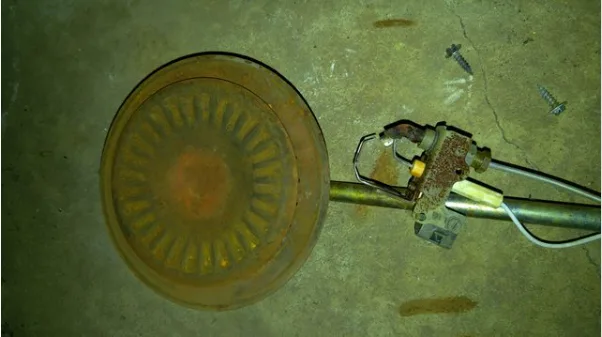
A bit of flake or rust on the burner is normal. However, if there is a significant amount of flakes, there is something crappy.
For instance, it will cause condensation in the flue if the incoming water supply is so cold. And when the condensation leads to the burner, it will rust the burner. Actually, this problem will occur if the water heater is too small or you overuse it or overdraw its capacity.
What To Do:
As I mentioned, a little bit of flake is normal. So, you don’t need to take any corrective action. What you can do more is- just remove the burner assembly and blow away the debris or rust formation by using a vacuum cleaner.
Secondly, never overdraw the capacity of the water heater. Also, don’t forget to release the blockage from the flue if there is any.
How To Prevent Rust Formation On Water Heater?
Follow the below maintenance tips to stop the rust formation on your water heater, which will help prolong its life expectancy.
- Anode rod is prone to rust and it’s the main culprit that makes the corrosion process faster if it gets deteriorated. Due to the rusty anode rod, rust will start thriving to form inside the lining. To avoid this issue, you should inspect the anode rod annually and replace it if needed.
- It doesn’t matter in what area you live, the supply water contains at least a bit of mineral content. So, it’s normal to have a buildup of sediment settled on the tank at the end of the year. And this sediment build up will start corroding the tank if you don’t flush the unit annually. In short, flush the water heater every year or every six months depending on the level of hard water in your area.
- Install a water softener if you live in a hard water area.
- If you install your water heater in a dump area like the basement, you should inspect the water heater annually. Try to install the unit in a dry and moisture-free location.
FAQs
Is it normal to have rust on a water heater?
Yes, it’s normal to have rust on a water heater as the supply water itself contains minerals and it will form corrosion over time. However, if your water heater is relatively new or you installed it last few months ago, rust formation on the water heater will indicate something bad.
Poor soldering job, blockage in the flue, and shorted heating element can allow the rust to build up on your water heater. Fortunately, I broke down everything you need to know about rust formation.
Can a rusty water heater make you sick?
It actually depends on where the rust is coming from. If the rust is coming from copper and lead and leaches into the water, it can be dangerous. However, corrosion from iron won’t do much harm than giving a metallic taste to the water. [1]
Can you repair a rusted hot water heater?
A rusted hot water heater is repairable or not depending on where the rust forms on the unit. If the water heater corrodes from the outside of the tank, it’s beyond repair. In this case, you must replace the entire unit.
End-Note
Corrosion buildup on the water heater decreases the efficiency of the water heater. And a less efficient unit means you will get no hot water out of the unit.
If you want to make your unit more efficient, you must remove the rust from the unit or replace it if it’s not repairable. Fortunately, I discussed everything you should know about a rusty water heater, how the rust forms, and how you can remove the corrosion.
However, you can call a professional as well to service your rusty water heater. Take expert opinion from a plumber to learn whether the unit is repairable or not. Good luck!
Read Also:

Eric Alvarez is the head of content on LilDutchUncle.Com. He is an HVAC guy based in El Paso, Texas, United States. He obtained his Bachelor of Science degree from the University Of Texas at El Paso. Years of experience in the HVAC field have taught him many lessons, not the least of which is that the value of quality and knowledge far exceeds any promised initial savings. He has a good standing reputation for superior skills in heating, air conditioning, hot water tanks, and indoor air quality systems.

